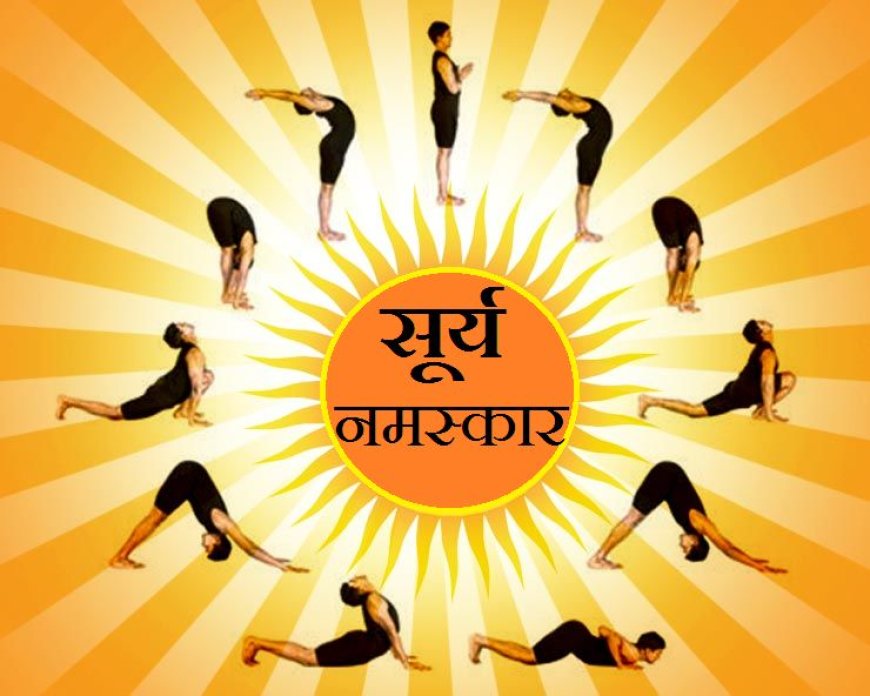Surya Namaskar and its Benefits

Surya Namaskar
Surya Namaskar, also known as Sun Salutation, is a traditional yoga practice that consists of a sequence of asanas (postures) performed in a flowing manner. It is a popular practice in many styles of yoga and is considered a complete exercise for the body and mind.
The Surya Namaskar sequence typically involves a series of 12 postures that are performed in a specific order. Each posture is coordinated with the breath, creating a harmonious flow of movement and breath. The sequence is traditionally practiced facing the rising or setting sun, as a form of salutation to the sun and an expression of gratitude for its life-giving energy.
Surya Namaskar offers numerous benefits, including increased flexibility, improved strength and endurance, enhanced blood circulation, better digestion, and a sense of calmness and mental clarity. It is a versatile practice that can be modified to suit different levels of fitness and flexibility.
Benefits of Surya Namaskar
Surya Namaskar, or Sun Salutation, offers several benefits for the body, mind, and overall well-being. Here are some key benefits of practicing Surya Namaskar:
-
Physical Fitness: Surya Namaskar provides a complete workout for the body. It stretches and strengthens the muscles, improves flexibility, and tones the entire body, including the arms, legs, abdomen, and back.
-
Improved Flexibility: The sequence of asanas in Surya Namaskar helps increase flexibility in the spine, shoulders, hamstrings, and hip joints. Regular practice can gradually improve overall flexibility and range of motion.
-
Enhanced Blood Circulation: Surya Namaskar promotes blood circulation throughout the body. The movements, combined with deep breathing, oxygenate the blood and improve the functioning of the cardiovascular system.
-
Weight Management: Surya Namaskar is an effective practice for weight management. The dynamic movements and increased metabolic rate during the practice can help burn calories and aid in weight loss.
-
Increased Energy Levels: The practice of Surya Namaskar invigorates the body and boosts energy levels. The combination of physical movement, breath control, and focused attention helps awaken and refresh the entire system.
-
Stress Relief: Surya Namaskar is known to have a calming effect on the mind and can help reduce stress and anxiety. The rhythmic flow of movement, coordinated with breath, promotes relaxation and mental clarity.
-
Improved Digestion: The asanas in Surya Namaskar stimulate the digestive system, promoting better digestion and absorption of nutrients. Regular practice can help alleviate digestive issues and improve overall gut health.
-
Mental Focus and Clarity: Surya Namaskar involves synchronized movement and breath, which enhances concentration, focus, and mental clarity. It can help calm the mind, reduce mental fatigue, and improve overall cognitive function.
-
Balancing of Hormones: The practice of Surya Namaskar can help regulate the endocrine system, which is responsible for hormone production and balance in the body. Regular practice may contribute to hormonal equilibrium and overall well-being.
-
Spiritual and Mindful Practice: Surya Namaskar has deep roots in ancient yogic traditions and is often performed as a form of moving meditation. It can help connect the practitioner to a deeper sense of self-awareness, spirituality, and inner peace.
Surya Namaskar Steps with coordination of breath

1. Pranamasana (Prayer pose):
-
- Stand at the front of your mat.
- Bring your feet together, heels touching.
- Keep your palms pressed together in front of your chest in a prayer position.
-
Hastauttanasana (Raised Arms pose):
- Inhale deeply.
- Raise your arms up overhead.
- Arch your back slightly and gaze upward.
-
Hasta Padasana (Hand to Foot pose):
- Exhale and bend forward from the waist.
- Keep your spine straight.
- Bring your hands down beside your feet or fingertips in line with your toes.
-
Ashwa Sanchalanasana (Equestrian pose):
- Inhale and step your right leg back.
- Lower your right knee to the floor.
- Keep your left foot between your hands.
- Gaze upward and open your chest.
-
Dandasana (Stick pose):
- Hold your breath.
- Step your left leg back to join your right leg.
- Keep your body straight, like a plank or push-up position.
- Arms are perpendicular to the floor, palms shoulder-width apart.
-
Ashtanga Namaskara (Salute with Eight Parts or Knees-Chest-Chin pose):
- Exhale and lower your knees, chest, and chin to the floor.
- Keep your hips raised.
- Eight parts of your body touch the floor—two hands, two feet, two knees, chest, and chin.
-
Bhujangasana (Cobra pose):
- Inhale deeply.
- Slide your body forward and raise your chest, keeping your legs and pelvis on the floor.
- Arch your spine, open your heart, and lift your gaze upward.
-
Adho Mukha Svanasana (Downward-Facing Dog pose):
- Exhale and lift your hips, forming an inverted "V" shape with your body.
- Press your palms and heels into the floor.
- Straighten your legs as much as possible.
-
Ashwa Sanchalanasana (Equestrian pose):
- Inhale deeply.
- Step your right foot forward between your hands.
- Keep your left knee on the floor.
- Gaze upward and open your chest.
-
Hasta Padasana (Hand to Foot pose):
- Exhale and bring your left foot forward next to your right foot.
- Straighten your legs.
- Keep your palms on the floor or fingertips beside your feet.
-
Hastauttanasana (Raised Arms pose):
- Inhale deeply.
- Raise your arms up overhead.
- Arch your back slightly and gaze upward.
-
Pranamasana (Prayer pose):
- Exhale and bring your arms down.
- Return to the starting position with your palms pressed together in front of your chest.
Various chants (mantras) to be done during Surya Namaskar
Surya Namaskar can be practiced with or without chanting mantras. Chanting mantras during Surya Namaskar adds a spiritual and meditative dimension to the practice, deepening the connection to the Sun and invoking positive energies. Here are a few commonly used mantras that you can incorporate into your Surya Namaskar practice:
-
Om Mitraya Namaha: Pronunciation: Om Mee-trah-ya Na-ma-ha Meaning: Salutations to the friend of all, the one who is friendly and benevolent.
-
Om Ravaye Namaha: Pronunciation: Om Ra-va-ye Na-ma-ha Meaning: Salutations to the shining one, the illuminator.
-
Om Suryaya Namaha: Pronunciation: Om Sur-ya-ya Na-ma-ha Meaning: Salutations to the Sun, the dispeller of darkness and the source of life.
-
Om Bhanave Namaha: Pronunciation: Om Bha-na-ve Na-ma-ha Meaning: Salutations to the one who illuminates, the bright and radiant.
-
Om Khagaya Namaha: Pronunciation: Om Kha-ga-ya Na-ma-ha Meaning: Salutations to the one who moves swiftly like a bird, the one who is all-pervading.
-
Om Pushne Namaha: Pronunciation: Om Push-ney Na-ma-ha Meaning: Salutations to the nourisher, the one who provides strength and sustenance.
-
Om Hiranyagarbhaya Namaha: Pronunciation: Om Hee-rah-nya-gar-bha-ya Na-ma-ha Meaning: Salutations to the golden cosmic womb, the source of creation and abundance.
-
Om Marichaye Namaha: Pronunciation: Om Ma-ri-cha-ye Na-ma-ha Meaning: Salutations to the rays of light, the one who illuminates and enlightens.
-
Om Aadityaaya Namaha: Meaning: Salutations to the radiant Sun, the giver of life and energy.
-
Om Savitre Namaha: Meaning: Salutations to Savitr, the divine Sun, the inspirer of all beings and the source of illumination.
-
Om Akaarye Namaha: Meaning: Salutations to the embodiment of action, the Sun, whose rays activate and inspire us to perform our duties.
-
Om Bhaaskaraaya Namaha: Meaning: Salutations to Bhaaskara, the illuminator, who dispels darkness and brings light into our lives.
-
Om Sri Savitru Surya Naaraayanaaya Namaha: Meaning: Salutations to the divine combination of Savitru, Surya, and Narayana—the triple representation of the Sun as the source of energy, light, and sustenance.
What's Your Reaction?






















































